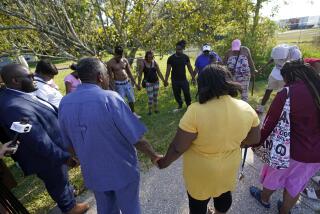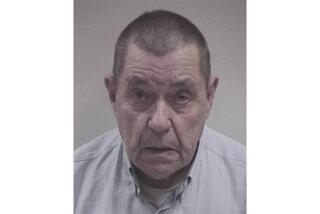Murder charge is filed in killing of Trayvon Martin
SANFORD, Fla. — For weeks, protesters around the nation have demanded the arrest of George Zimmerman.
A Florida special prosecutor made that happen Wednesday. She announced that Zimmerman — the neighborhood watch volunteer who admitted to fatally shooting an unarmed black teenager on a rainy night here in February — had turned himself in and would be charged with second-degree murder in the death of 17-year-old Trayvon Martin.
“We did not come to this decision lightly,” said Florida State Atty. Angela Corey at a news conference in Jacksonville.
Alluding to the intense publicity surrounding the case, she added, “Let me emphasize that we do not prosecute by public pressure or by petition.”
Corey declined to discuss the details of the investigation that led her office to charge Zimmerman, who had claimed self-defense — and who had been free, though in hiding, for weeks. Nor would she say where he was being held, “for his safety as well as for everyone else’s safety.”
It was a reminder of the volatile nature of a case that has plunged the country into the kind of difficult and impassioned conversation about race and justice that has followed other notorious racial incidents, from the lynching of Emmett Till in 1955 to the police beating of Rodney King in 1991.
“It feels good to know he’s off the streets. I feel very good just … knowing he’s off the street, that he’s in custody, that the wheel’s starting to turn in our favor,” Trayvon Martin’s father, Tracy Martin, told a Washington news conference.
Sybrina Fulton, the teenager’s mother, said as she fought back tears: “I want to say thank God. We simply wanted an arrest. We wanted nothing more, nothing less. We just wanted an arrest and we got it, and I say thank you.”
Alluding to the racial overtones of the case, she added: “I just want to speak from my heart to your heart because a heart has no color. It’s not black, it’s not white.”
Zimmerman will plead not guilty, said Mark O’Mara, his new attorney. Self-defense would be “one facet” of the defense, O’Mara told CNN, adding that Zimmerman was “troubled” by the new charges but “doing OK” considering his circumstances.
In Florida, second-degree murder is typically charged in the event of a death stemming from a fight or confrontation that does not involve premeditation. It can result in a life sentence when a gun is used.
In Sanford, a city of 53,000 with a history of racial tension, some African Americans had said they were worried that riots would break out if charges were not forthcoming against Zimmerman, who is half white and half Latino.
On Tuesday, someone shot up an empty police car parked near Zimmerman’s neighborhood. On Wednesday, African American resident Troy Jackson, 43, said he might participate in a riot if there were no charges. “I’m going to loot every Caucasian store,” he said, sitting in front of a grocery store in the majority-black Goldsboro community. “Blood for blood.”
But as the news of the arrest trickled out, there was a palpable sense of relief.
“I feel like this is the beginning of seeing justice prevail,” said Sanford resident Gloria Baskerville, 54.
Baskerville, who is black, said she was convinced she would have been immediately arrested if she had been in Zimmerman’s shoes. All she ever wanted to see, she said, was an arrest. If Zimmerman is now acquitted by a jury, she said, “I would have to be satisfied with whatever the outcome is.”
After an initial investigation, Sanford police officials said that bringing charges against Zimmerman was complicated by Florida’s “stand your ground” law, which allows for the use of deadly force in some life-threatening situations.
Many critics have claimed that the shooting — and the lack of an arrest — stemmed from the fact that the victim was a young black man, considering it cut-and-dried evidence of the social injustices that people of color in the United States have long faced.
President Obama even weighed in, calling the story a “tragedy,” and adding, “If I had a son, he’d look like Trayvon.”
Zimmerman had taken a vigorous interest in the safety of his neighborhood, which had suffered a rash of break-ins in the weeks leading up to the evening of Feb. 26, when he spotted Martin, 17, returning from a convenience store with a bag of Skittles and an iced tea.
Zimmerman was driving out of his gated town-home development on his way to the supermarket, when he called police and reported Martin as “a real suspicious guy” who looked like “he’s up to no good or he’s on drugs, or something.”
The police dispatcher asked Zimmerman whether he was following the youth. When Zimmerman replied that he was, the dispatcher told him, “We don’t need you to do that.” Moments later, Zimmerman — armed with a 9-millimeter weapon — got out of his car.
Zimmerman has said he shot Martin in self-defense after the youth struck him in the face, knocked him down and began pounding his head into the ground. Others suspect Zimmerman was the aggressor, one who overstepped the legal bounds of a concerned citizen.
Coverage of the case was largely limited to local media until the call between Zimmerman and the dispatcher was made public, along with a 911 call that one resident made just before the shooting. In the background of that call, someone can be heard yelling for help. Martin’s parents insist that voice belonged to their son. Zimmerman has said the voice was his.
The Sanford police chief stepped down as national attention snowballed. On March 23, Florida Gov. Rick Scott appointed Corey, a state attorney from Jacksonville, to take over the investigation.
The Justice Department, meanwhile, is conducting a separate investigation to determine whether Zimmerman should be charged with violating Martin’s civil rights. U.S. Atty. Gen. Eric H. Holder Jr. said Wednesday that “if we find evidence of a potential federal criminal civil rights crime, we will take appropriate action.”
Zimmerman’s friends and family have argued that he is neither a racist nor a hothead, and have said that the facts would vindicate him.
This week, Zimmerman launched a website soliciting donations for his living and legal expenses. It was also peppered with quotations, including one attributed to British statesman Edmund Burke:
“The only thing necessary for the triumph of evil is that good men do nothing.”
TheRev. Al Sharpton, though pleased with the news of the murder charge, said it was not a cause for celebration.
“We do not want anyone high-fiving tonight. There’s no victory here. There’s no winners here. They’ve lost their son,” he said as Martin’s parents stood somberly beside him. “This is not about gloating. This is about pursuing justice.”
Times staff writers Tina Susman, Rene Lynch and Michael Muskal contributed to this report.
More to Read
Sign up for Essential California
The most important California stories and recommendations in your inbox every morning.
You may occasionally receive promotional content from the Los Angeles Times.










